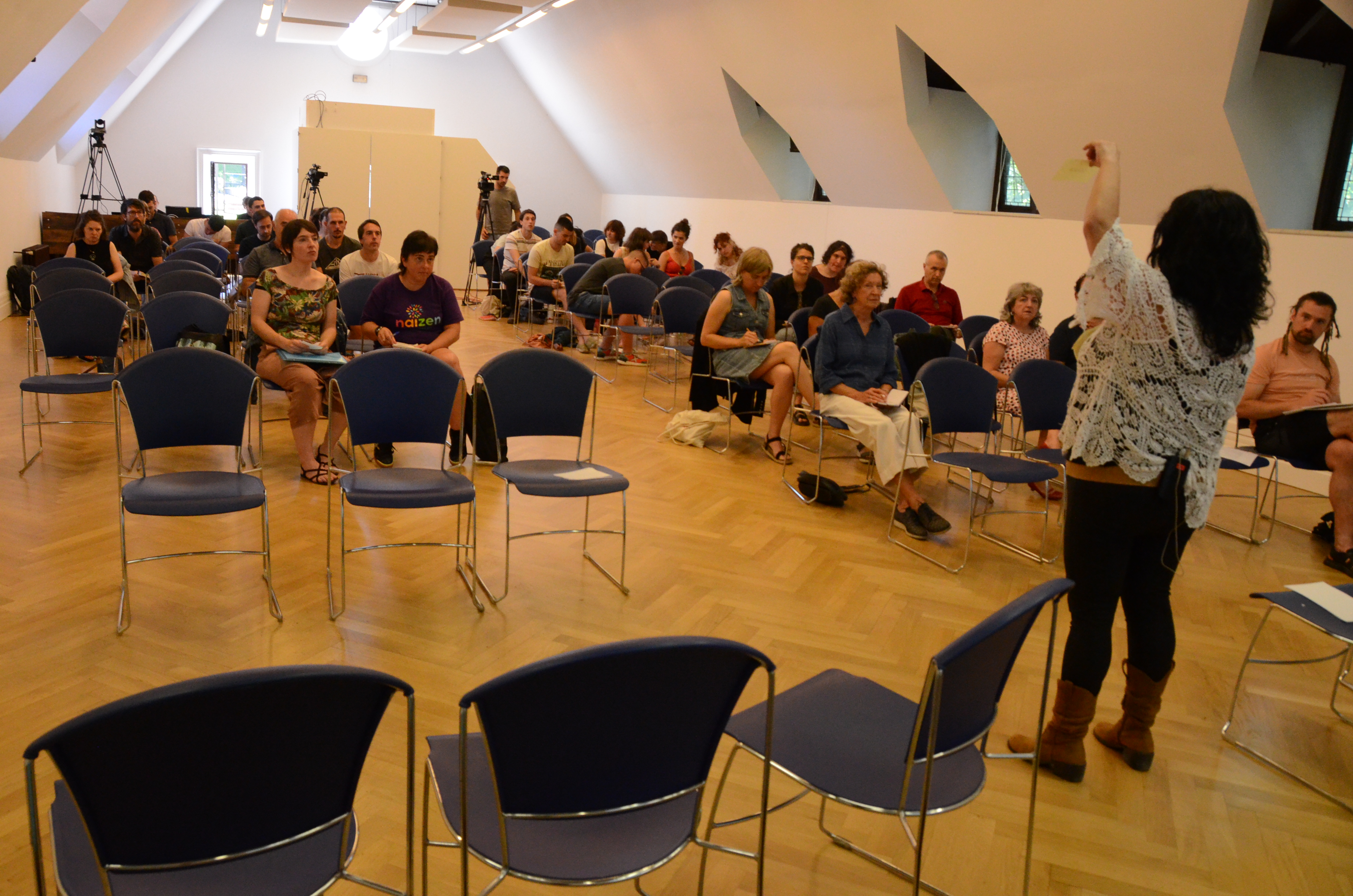
- Last Thursday and Friday, the course “Where and what are we doing bertsos?” was held, in which 50 people met to reflect on issues related to Bertsolarism.

The course “Where and what are we doing bertsos?” has been its second day. The course is organized by the Association of Bertsozales of the Basque Country, within the summer courses of the UPV/EHU. Yesterday the programme of conferences and round tables was completed, and other conferences have been held today. Here you have the photo gallery of the two days.
Jexux Mari Irazu Muñoa was the first speaker of the day and talked about Bertsolarism in the free mode. He has reflected on his limitations and possibilities, and has explained that in the world of free Bertsolaris, by making a nod to the name of the course, influences who and what he sings. Being a non-themed Bertsolaris, Irazu said that it gives the possibility for Bertsolaris to make a subject that is at the heart of their interests and that it is best for there to be as broad a profile as possible of bertsolaris so that the issue does not generate gender or age disproportion. On the other hand, he recalled that although free Bertsolarism has a great presence in the plaza, in terms of dissemination it is the festivals and competitions that get the most impact. It reflects on whether this can generate imbalances, but concludes: "Open-air Bertsolarism owes a lot to competition, because the echo it receives is the one that illuminates a structure next to it, that of the championship."
The program will be attended by Bertsolari Alaia Martin Etxebeste and Imanol Artola Arretxe, author of the themes. Both have agreed that the same author is the author and have manifested their lack of visibility. Artola explained that a session has a great deal of previous work and stressed the importance of balance: the balance between bertsolaris, bertsos and exercises. Martin agreed with him and stressed the importance of balance, but he also mentioned improvisation, and explained that he sees it more important to break a certain moment of balance so that all participants are more comfortable: "It's as important as the number of raised bertsolaris for what we've raised them for," he added. Finally, Artola explained that when working on the issue, the goal is for the proponent, listeners and bertsolaris to be placed in an equilateral triangle and all three are as close as possible.
Is the socio-economic situation tired? The next two conferences have been launched with a question. Aitor Bizkarra Ruiz has been the first speaker; Oihana Iguaran Barandiaran, the second.
Aitor Bizkarra has emerged from the provocative hypotheses and stated that he is putting "pods" in the responses of journalists. As for the relationship between Bertsolarism and art in general and politics, he has explained the importance of improvisation. To this he added that if political content is to be made aesthetically, it must coincide with the framework of understanding the plaza. In addition to what is said, he also wished to stress the importance of what is not said.
After the break Oihana Iguaran has taken the floor. In his opinion, bertsolari sings about the realities that live and surround him, so it is necessarily dedicated to the socio-economic situation and the political issues of the moment. “This discourse is configured within the conditions that Bertsolarism has as a communicative practice and, consequently, part of the visions imposed by the practice in Basque and from Euskal Herria: from a Western nation, with white privileges, in a minority language and without state. The question is to what extent are the gaps as creators to this starting point.”
The last two speeches have revolved around the same subject. Oihane Perea Perez de Mendiola has been the first to speak and has put the students who take part in the course to work: on the one hand, he has made a list of those who are made in bertsolaris schools to work the way; on the other, beyond the form. With this, he wished to emphasize that the school of bertsolaris is also a school of life and that, beyond where it is made, in the schools of bertsolarism there are reflections, exchanges of opinions, shared search of paths and ideas. He also referred to emotions, which are also being worked on in the Bertso Eskolas.
Beñat Gaztelumendi Arandia was the last speaker in the programme and also talked about the Bertso Eskolas. He has stated that the decisions taken by Bertsolaris before or during singing affect speech and the elements that influence Bertsolaris. He has talked about the influence of the melodies, the ways of being on the stage, the theme behind the themes… He has explained that there is also a space to work and share those things.
Like yesterday, the lectures have been completed with the questions and contributions of the students. The lectures and round tables of the course are over, but from now on they will be echoed.
